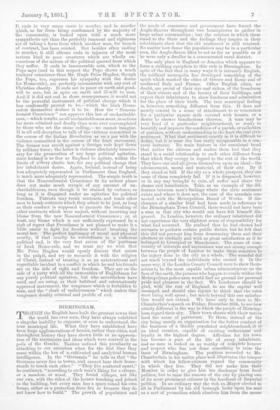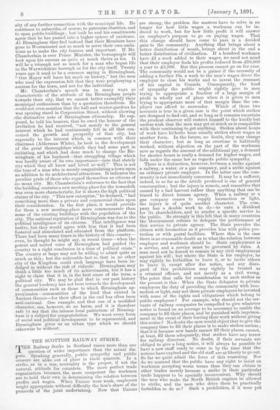BIRMINGHAM.
THOUGH the English have built the greatest towns that the world has ever seen, they have always exhibited a singular inability to organise, or even to understand, the true municipal life. What they have established have been huge agglomerations of houses, rather than cities, and throughout history they have shown little or no apprecia- tion of the sentiments and ideas which were centred in the polio of the Greeks. Tacitus noticed this peculiarity as attaching to our ancestors when for the first time they came within the ken of a cultivated and analytical human intelligence. In the " Germania " he tells us that "the Germans never live in towns, and cannot bear their home- steads to touch each other." "They live scattered apart," he continues, "according to each man's liking for a stream, or a meadow, or wood. They found villages, not like our own, with the sides of the houses touching and joined in the building, but every man has a space round his own house, either as a protection from fire or because they do not know how to build." The growth of population and the needs of commerce and government have :forced the Anglo-Saxons throughout two hemispheres to gather in huge urban communities ; but the relation in which these stand to the State and the feelings they inspire in their inhabitants show that the old sentiment is still retained. No matter how dense the population may be in a particular area, the Anglo-Saxon likes to act as far as possible as if he were only a dweller in a concentrated rural district.
The only place in England or America which appears to form a striking exception to this rule is Birmingham. In spite of the fact that in many ways it is intensely English, the midland metropolis has developed something of the spirit which marked the cities of Greece and Rome and of medissval Italy and France. Other English cities, no doubt, are proud of their size and riches, of the broadness of their streets and of the beauty of their buildings, and expect their inhabitants to show fondness and admiration for the place of their birth. The true municipal feeling. is, however, something different from this. It does not merely consist in a sense of attachment to or veneration for a particular square mile covered with houses, or a desire to shower benefactions thereon. A man may be very fond of a, particular neighbourhood, or ready to beautify and improve the condition of a parish, or collection of parishes, -without understanding in the least the real civic sentiment. What that sentiment exactly is, it is difficult to define, but it is none the less easily recognisable in a con- crete instance. Its main feature is the emotional bond that unites the citizens and makes them feel that they stand in a social relationship to each other different from that which they occupy in regard to the rest of the world. They have one and all given themselves up to an ideal—the advancement, moral and material, of their city. By it they stand or fall. If the city as a whole prospers, they can none of them completely fail. If it is disgraced, however, or in any way brought to ruin, all suffer and share the shame and humiliation. Take, as an example of the dif- ference between men's feelings where the civic sentiment exists and where it does not, the case of the scandals con- nected with the Metropolitan Board of Works. If dis- closures of a similar kind had been made in reference to the Birmingham Town Council, there would not have been a man in that city who would not have felt himself dis- graced. In London, however, the ordinary inhabitant did not experience the very slightest sense of responsibility for what had occurred. He realised that he had chosen bad servants to perform certain public duties, but he felt that this did not prevent him from denouncing them and their abettors as cordially and with as great satisfaction as if he belonged to Liverpool or Manchester. The sense of com- munity of interests and aspirations was not strong enough between the people of London to make them sensitive to the injury done to the city as a whole. The scandal did not reach beyond the individuals who caused it. In the same way, if the London County Council were to show them- selves to be the most capable urban administrators on the face of the earth, the persons who happen to reside within the Metropolitan police area would find no ground for personal pride and pleasure in the fact. We Londoners should be glad, with the rest of England, to see the capital well managed, and should also rejoice to think that the rates. were being well spent ; but much beyond this our satisfac- tion would not extend. We have only to turn to Mr. Chamberlain's speech on Friday, December 26th, to see how utterly different is the way in which the people of Birming- ham regard their city. Their town shares with their native land the sense of patriotism. To them, instead of the city being merely an organisation for the better conduct of the business of a thickly populated neighbourhood, it is an ideal creation, capable of exciting enthusiasm and loyalty in the highest degree. Affection for his town has become a part of the life of every inhabitant, and no man is looked on as worthy of complete honour and respect who has not done something to raise the fame of Birmingham. The position accorded to Mr. Chamberlain in his native place well illustrates the temper with which his fellow-citizens regard the community' in which they live. They did not make him their. Member in order to give him his discharge from local politics, but to raise the renown of the city by placing one of its most prominent citizens in the forefront of Imperial politics. In an ordinary way the rich ex-Mayor elected to sit in Parliament by his old borough looks upon his seat as a sort of promotion which absolves him from the neces- sity of any further connection with the municipal life. He continues to subscribe, of course, to patronise charities, and to open public buildings ; but both he and his constituents agree that he has passed into a higher sphere of existence. At Birmingham they feel instead that their Members have gone to Westminster not so much to serve their own ambi- tions as to make the city famous and important. If Mr. Chamberlain is ever Prime Minister, the townspeople will look upon his success as quite as much theirs as his. It will be a triumph not so much for a man who began life in the Warwickshire borough as for the city itself. Twenty years ago it used to be a common saying in Birmingham, "Our Mayor will leave his mark on history," but the men who used the expression felt that they were prophesying a success for the town, and not for the individual.
Mr. Chamberlain's speech was in many ways so characteristic of the attitude of the Birmingham people towards their city, that we cannot better exemplify their municipal enthusiasm than by a quotation therefrom. He .could not even mention that the hall and winter-gardens he was opening stand in Corporation Street, without showing /the distinctive note of Birmingham citizenship. He sup- posed, he told his hearers, that he owed the honour of the invitation he had received, not merely to the general interest which he had continuously felt in all that con- cerned the growth and prosperity of that city, but • especially to the interest which, in common with their chairman (Alderman White), he took in the development of the great thoroughfare which they had some part in ,initiating, and which had done much to change the Bir- mingham of his boyhood—that straggling village which was hardly aware of its own importance—into that stately city which they all knew and loved so well." This is not ,the tone of a man who is merely congratulating a town upon an addition to its architectural attractions. It indicates the peculiar pride of those who regard themselves as citizens of no mean city. Mr. Chamberlain's reference to the fact that • the building contains a new meeting-place for the townsfolk was even more characteristic, for it shows the high political .claims of the city. "This new enterprise," he declared, "had something more than a private and commercial claim upon their consideration. In the first place, it would provide for them a new meeting-place more commensurate than some of the existing buildings with the population of the city. The national reputation of Birmingham was due to the political intelligence of its citizens. That intelligence was native, but they would agree with him that it had been fostered and stimulated and educated from the platform. 'There had been many times in the history of this country— oven, he thought he might say, in recent times—when the potent and united voice of Birmingham had guided the - country to a right conclusion in a time of political crisis." The country at large may not be willing to admit quite as much as this ; but the noticeable fact is, that in no other -city of the Kingdom could such language have been in- dulged in without the risk of ridicule. Birmingham may think a little too much of its achievements, but it has a -right to claim that it is, in the best sense of the term, a political city. We may be glad that in our past history the general tendency has not been towards the development of communities such as those to which Birmingham ap- ,proxirnates—communities of the kind that existed in Ancient Greece—for their effect in the end has often been anti-national. One example, and that one of a modified . character, can, however, do no harm, and it is therefore , safe to say that the intense local patriotism of Birming- ham is a subject for congratulation. We want every form of social and political development to be represented, and Birmingham gives us an urban type which we should .otherwise be without.















































 Previous page
Previous page